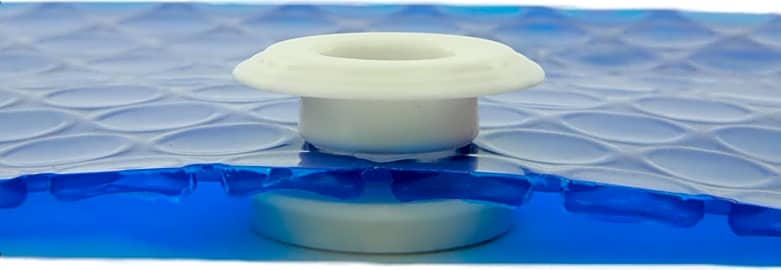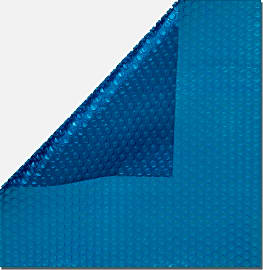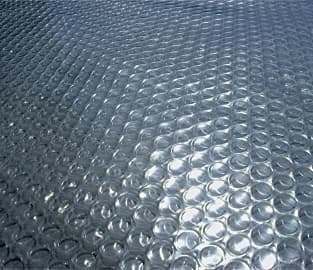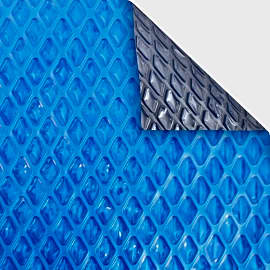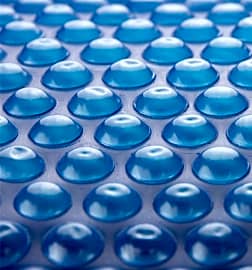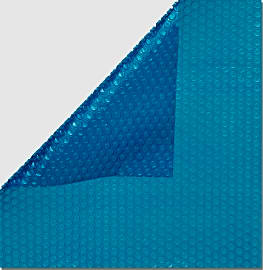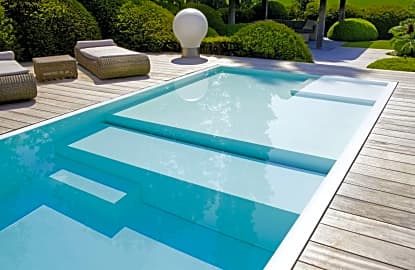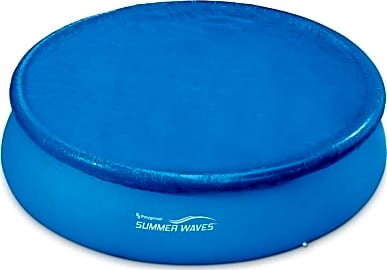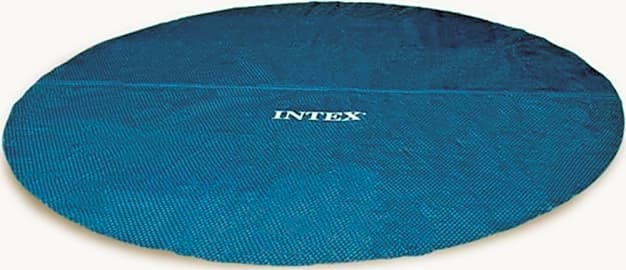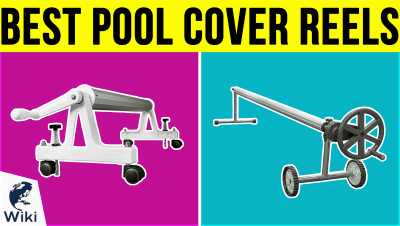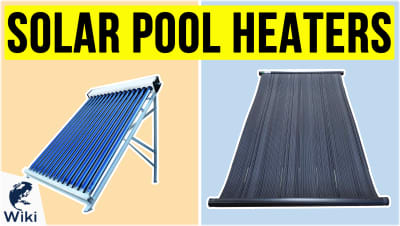The 10 Best Solar Pool Covers

This wiki has been updated 40 times since it was first published in April of 2015. Heating your pool can get very expensive very quickly if you rely solely on electricity or natural gas. These solar covers can not only save you money on your energy costs by preventing heat loss at night, but they will also help to warm up your pool throughout the day and minimize water evaporation. Be aware that covers can present a drowning hazard if they are not fully removed before swimming. When users buy our independently chosen editorial recommendations, we may earn commissions to help fund the Wiki.
Editor's Notes
July 09, 2020:
It was a busy round of updates, with widespread availability issues and quality questions requiring that the majority of our previous selections for this category be replaced. The few options that we did retain are the Intex Round 29025E, the In The Swim Basic Round and the Blue Wave NS520. Some of our new selections this time around include the 636643 Summer Waves — a drawstring model that’s suitable for above ground pools smaller than 15 feet in diameter, the In The Swim Ultra — a 16-mil offering with an eight-year warranty, and the Sun2Solar Rectangular 1600 Series — which includes a six-pack of grommets that come in handy for drainage or attachment purposes.
A few things to think about for this category:
Thickness: In the case of solar pool covers, this is usually measured in mils — a tiny unit of measurement equivalent to 1/1,000 of an inch. Typically, basic models start at eight mils, with 12-mil options being a common upgrade, and 16-mil models available for users who like heavy-duty equipment.
Thicker covers tend to be more expensive, but they’re also more durable, and to a better job insulating. However, some users still prefer slimmer covers, as they’re more affordable and easier to unroll. Low-quality pool cover reels can also have trouble supporting the weight of a 16-mil cover, and in some cases users have noted that the extra girth of a 16-mil cover has made it impossible for them to roll up their cover underneath their diving board.
Opacity: While variations are available, there’s essentially three major styles of solar-cover to choose from:
Clear: The lighter the color, the more heat it lets through into your water, so clear covers – like the Blue Wave NS520 – make a good choice for users who tend to keep their pool covered during the day, as they’ll help make the most of the sun’s rays. However, they don’t do the best job at insulating, so expect your covered pool to see a drop in temperature overnight.
Dark: The darker the color, the better the insulation it offers, making dark covers – like the In The Swim Ultra – a good choice for users who keep their pool covered overnight, as they’ll do a great job at retaining all the heat your pool picked up during the day. However, opaque covers like these bounce a lot of the sun’s rays right off them, so they won’t warm your pool up as much during the day as a clear cover will.
Light: Light covers – like the Sun2Solar Rectangular 1600 Series – are the most popular selection on the market, as they offer users an appealing best-of-both-worlds option, doing a decent job at both heating and insulating. If you like to use your pool sometimes at night, and other times during the day, then we recommend a light cover to you.
Size: There’s no shortage of sizes available on the market. And, if you have a round or rectangular pool, there’s a good chance that you’ll be able to find a nominally sized option that’s a near match.
However, for users with oddly shaped pools, trimming might be necessary in order to achieve an acceptable fit. Even in the case of nominally sized pools, some incisions may be necessary in order to accommodate your pool ladders and handrails. If you are considering trimming your cover, make sure that you go with a company like Sun2Solar, which will still honor its warranty on covers that have been trimmed.
April 18, 2019:
There aren't too many things that one must consider when choosing a solar pool cover. Simply picking the correct size and shape gets you half way there. After that, the only other things worth thinking about are the thickness, which generally translates into durability and heat retention capabilities, and color if you are concerned about how it looks. If you want maximum toughness and heat retention overnight, we recommend you take a look at the Harris Round, Blue Wave NS520, and Midwest Canvas Clear Oval, as all three boast a thickness of at least 14 mils. Unfortunately, thicker options like these are also heavier, which can make them difficult for one person to manage. If you want something a little easier to maneuver, you should check out the Heritage Splash SCV 2412, In The Swim 8-mill, Thermo-Tex Rectangle, and MidWest Canvas Space Age. The Intex 29026E conveniently comes as a combo package that includes a roller for truly effortless installation and removal. Whichever model you decide to choose, just make sure it is large enough to completely cover your pool for maximum effectiveness.
Solar Powered, But Not Electric
Perhaps even more important than the heating ability of your solar pool cover, is its heat retention.
We've all jumped into a pool that was just a little too cold. Or a lot too cold. It's a shocking moment, and if it's intense enough, it could take all the pleasure and peace out of what is supposed to be a refreshing dip. What's more, if you rely on swimming as a primary source of exercise–maybe you've got joint issues, for example–, the window through which you can enjoy your outdoor pool is severely limited by the seasons.
Even in southern California, an outdoor in-ground pool is only comfortable for swimming from about late April through early September. A solar powered pool cover can make an immense amount of difference. With one installed over my pool, our comfortable swimming period has been extended from late March to mid-November.
The material is designed to absorb sunlight and transfer that heat to the water below. The process takes time, but it can increase the temperature of your pool by five degrees over the course of 12 hours.
Perhaps even more important than the heating ability of your solar pool cover, is its heat retention. Pools lose a tremendous amount of heat throughout the night, when the air above the water dips below the temperature of the water itself and the water evaporates.
The inverse of what happens during the daytime happens with your solar pool cover in the night, as its backside is designed to trap heat in the pool water and prevent it from being transferred to the night air.
By these means, your pool will get significantly warmer, and insignificantly cooler each day until it levels out at a wonderful average.
Bubble Up To The Top
I can imagine the look of confusion and disappointment on the face of a customer whose pool cover has just arrived, only to be a round shape floating awkwardly in his rectangular pool.
After that, the size, shape, or quantity of the bubbles is pretty irrelevant to the fact of the bubbles themselves, which represent the best heat transfer of any cover type.
Picking the right cover for your pool is paramount, and that starts with the shape. It's the most obvious piece of advice, but you definitely want to confine your purchase to a shape that most closely resembles your actual pool. Don't get any bright ideas about saving a few bucks by buying a round cover and cutting it and reshaping it to fit your quadrilateral. Remember, these covers are as much about insulation as anything else, so the less cutting you have to do to get it to fit, the better.
From brand to brand, one of the most easily recognizable factors in the price of a pool cover is its thickness. A thicker cover is going to be more durable against falling debris from trees, satellites plummeting out of orbit, etc., and it's going to do a better job keeping the heat you've built up in the water from escaping.
Some pool covers will brag about the size of their bubbles, while others will flaunt fancy bubble shapes, or spout some statistic about how they've crammed more bubbles onto their cover than anybody else. This is one of those "six of one, a half-dozen of the other" moments. The thing you want to be sure of is that the space between the bubbles is limited. After that, the size, shape, or quantity of the bubbles is pretty irrelevant to the fact of the bubbles themselves, which represent the best heat transfer of any cover type.
Pools Of The Rich And Famous
One of my earliest memories swimming in the ocean involves a large, as-yet-unidentified fish swimming beside me and bumping up against my leg. It scared me nearly to death, as I had only recently seen Jaws for the first time, and was sure I was about to be eaten alive.
For that and other reasons, I find it hard to believe anybody would willingly choose to have fish living in their swimming pool, but the swimming pool as we know it dates back far enough that we find several Roman emperors who kept fish in their pools with them.
One of my earliest memories swimming in the ocean involves a large, as-yet-unidentified fish swimming beside me and bumping up against my leg.
Pools and baths and spas of these sorts were popular among the noble classes, and many of these were naturally occurring hot springs like the baths in Ibsen's famous play An Enemy Of The People. It really wasn't until several public pools were constructed in the mid-19th century UK that the concept of confined recreational swimming became a popular option for laymen.
The development of private swimming pools in people's homes came from exactly where you'd expect: Hollywood. The notion of having a private pool of your own gained traction as a status symbol in the Hollywood boom eras following each of the World Wars. As of 2009, the total number of pools in the US according to the International Aquatic Foundation was just north of eight million.
That's a lot of lost heat. Up until the late 50s, most people just threw some canvas down around the pool and weighed the edges with sandbags if they wanted any kind of cover. It wasn't until 1959 that a retractable canvas cover was created, the popularity of which spurred on the development of cheaper, lighter, more efficient alternatives, a development process that has given us these feather-light, supremely effective solar covers.


